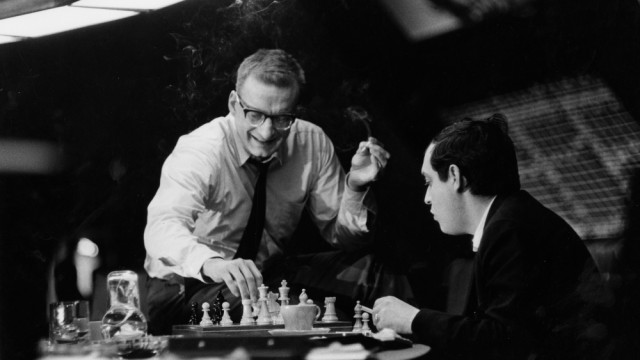So, as we near the end of our journey through the Kubrick filmography (two entries left), what have we learned?
Kubrick has a reputation as an intellectual filmmaker, and “intellectual” gets used often in opposition to “personal.” Yet intellect is as personal a quality as any other–emotion, appearance, aesthetics–and just labeling (or dismissing) Kubrick with “intellectual” doesn’t say what that intellect is or how it approaches the world. Kubrick’s intellect was essentialist; I’d say philosophical but that doesn’t go far enough. At his very best, he was seeking the ideal types of characters, of images, of stories, of dialogue, the Forms of his subjects. (To compare him to other filmmakers labeled as “intellectual”: Werner Herzog’s intellect is ecstatic, Steven Soderbergh’s is methodical.) Deep in the comments on Full Metal Jacket, Declan Giggs and I got into a conversation on the Clash, and we realized that their tagline “The Only Band that Matters” works with Kubrick too. You can come out of a great Kubrick film thinking not that you’d seen all that could be seen about a subject, but that you saw what was essential, what was necessary, and anything else you saw about that may have been true, but it wasn’t interesting. You’d seen all you needed to see, and that’s why his great films have endured so long.
If you want a Grand Unified Theory of Kubrick, look at how he started his working life. Look at the photographs. You can see where he learned how to find the single frame that said everything, and you can see how learned to build that frame from lighting, from camera placement, from the lens, and taking the same shot again and again and again. Kubrick understood things so practically–he knew that it didn’t matter what the subject (a director has actors, a photographer has subjects) was thinking or feeling or sense-remembering, it only mattered what we saw, and he kept taking pictures until he got that. (I cannot recommend enough the online exhibition of his photographs at the Museum of the City of New York, where you can see all the alternate shots and possibilities.) You can see his sense of the iconic, and you can see the sense of humor that never left him and never left his films. His skill as a photographer makes my biggest wish for his career was that he had done was a full-length documentary. He was like any other artist: he did what he knew how to do. He took the skills of one discipline and adapted them into an adjacent one.
Of course, there are skills specific to film; try and jump directly from photography to filmmaking and you get Fear and Desire. Kubrick began learning and kept going to the end of his life (he was still trying out things with colors no one had ever done with Eyes Wide Shut) but the greatest skill he developed was editing, what Walter Murch called the fundamental and unique element of cinema. No one knew how to use a cut or a dissolve to change the entire world the way Kubrick did. The three-million-year jump cut in 2001 is the most obvious, but they’re in all his best works: the dissolve to Halloran in The Shining, the cut to Pyle in Full Metal Jacket, the cut to Ziegler and an OD’d hooker in Eyes Wide Shut. Kubrick’s films from The Killing onward were masterpieces of pacing, from that film’s relentless speed to the inescapable finale to Eyes Wide Shut’s equally relentless, dreamy slowness. Cinema is made of images and time; Kubrick had the first going in and learned the second pretty darn quick.
You also see in those photographs what Kubrick would develop in all his films, the expansive view of humanity, so far past what gets called “humanism.” As usual, my homie Michel Foucault nailed the limits of that definition: “humanism is everything in Western thought that restricts the desire for power.” Kubrick’s humans desired power from their first moment of humanity; they fight and fuck and they fuck up, because their power outruns their morality and their ability to control it. They fall in love when they’re not supposed to, they want things they can’t have, they make absurd justifications for the world they make. They also love each other. They also save each other. They are mothers and fathers and professionals and killers, and philosophers in the last moments of their lives. The greatest of Kubrick’s characters come through all of this and accept, but even the rest of them never, ever give up. From the photographs onward, Kubrick saw us as a crazy, beautiful, industrious species, and more than anything else, watching his films makes me proud to be part of it.
What say you? What do you think about our man Stanley? What are your favorite Kubrick films? Favorite stories and questions about him? Things that are just plain wrong or weird? Like the title sez, it’s an open thread. Sound off.
Here’s my ranking (with categories) of the feature films:
Greatest Movie of All Time:
1. Full Metal Jacket
Masterpieces (the best of cinema):
2. 2001: A Space Odyssey
3. Dr. Strangelove
4. Paths of Glory
Classics (anyone else’s best):
5. Barry Lyndon
6. The Shining
7. The Killing
8. Eyes Wide Shut
Pretty Darned Good (anyone else’s equal):
9. Spartacus
10. Lolita (gained the most on rewatch)
11. Killer’s Kiss
Nooooooooooope:
12. A Clockwork Orange (lost the most on rewatch)
13. Fear and Desire
Best Actress/Best Performance: Shelley Duvall, The Shining
Best Actor: George Macready, Paths of Glory
Best Ensemble: Full Metal Jacket
Best Screenplay: Kubrick, Michael Herr, and Gustav Hasford, FMJ
Runner-up: Kubrick, Terry Southern, and Peter George, Dr. Strangelove
Best Original Music: Vivian Kubrick, FMJ
Best Adapted/Selected Music: The Shining
Best Cinematography: John Alcott, Barry Lyndon
Previously: Soundtracking: Full Metal Jacket and the electronic scores
Next: Eyes Wide Shut (1999)


